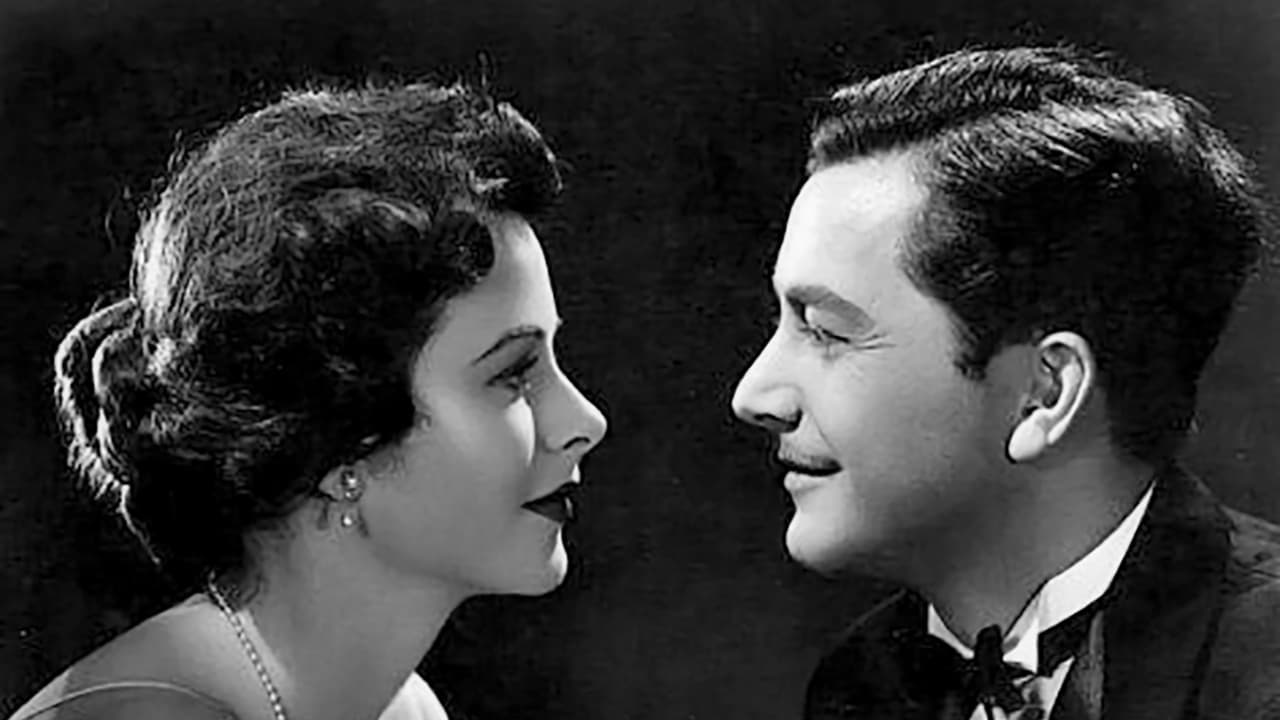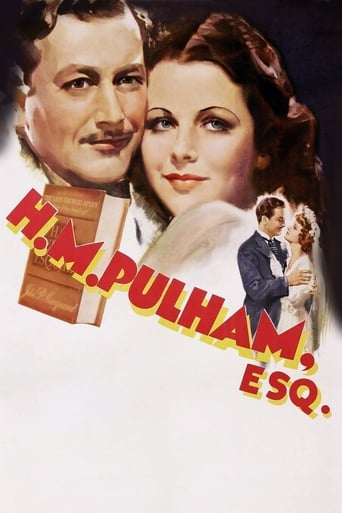WasAnnon
Slow pace in the most part of the movie.
Matialth
Good concept, poorly executed.
GetPapa
Far from Perfect, Far from Terrible
Married Baby
Just intense enough to provide a much-needed diversion, just lightweight enough to make you forget about it soon after it’s over. It’s not exactly “good,” per se, but it does what it sets out to do in terms of putting us on edge, which makes it … successful?
Andy (film-critic)
Throughout this project of watching nearly every movie ever made, or at least in every attempt possible, I am beginning to discover which films speak to me. There are those that entertain, those that mentally challenge, and those that transform your cinematic experience all together, but for me, the type of film that excites me these days are the delicate semi-biographical pre-1950s story. With a cautious blend of "Citizen Kane" and "Magnificent Ambersons" with that of the modern "Mad Men", the barely watched film, "H.M. Pulham, Esq." finally arrived at the doorstep. Unbeknownst that this film would be reminiscent of such films, I began with the unknown. Available only via Warner's print-on- demand DVD Vault, there was a level of uncertainty as to why this had never been released, or would the print be so destroyed the experience would be lost (see review of "The Lady and the Monster"). To my surprise, it wasn't – and this two hour epic ("epic" is correct; due to the emotion, landscape, and themes of this film) quickly filled the cannon that was once overpopulated by Orson Welles. With dry characters like Harry Pulham and Kay Motford countered with the exciting Marvin Myles and Bill King as well as the quintessential sledding scene (needed in every semi-biographical film), "H.M. Pulham, Esq." pulled ahead in the ranks as I settled down for an amazing feature. It was shocking, intelligent, slow, predictable, and a bit pioneering for the date – and I loved every minute of it."H.M. Pulham, Esq." tells the story of a man, Harry Pulham (played simply by Robert Young) as he randomly gets a call from a Harvard friend requesting that he write a bit of a biography for the upcoming reunion. Coincidentally, he gets a call the same day from an old flame, and Harry uses the entire day to give us the "It's a Wonderful Life" flashback scenario where we learn about his life, and current consequences. As we travel back and forth, we fall in love with a core of four characters, Harry (of course), Marvin Myles the sassy co-worker, Bill King the obnoxious lady-killer, and Kay everyone's safe bet. It is these four characters that take us from New York to the country, from love to hate, and from passion to comfort. As Harry continues to look back onto his life, he begins to question his decisions, and the world of possibilities available."H.M. Pulham, Esq." would not have worked had it not been for these four characters. It is a driven character drama, thus without our actors taking full opportunity, it would have transformed into this two-hour snooze-fest, but instead they embraced, and allowed us to get to know each one individually, as well as a whole. Robert Young's Harry is probably the easiest to swallow, because is portrays him as this unguided everyman, lured by the life of NYC, but focused on family and dedication. His friends pull him in every direction, but he is grounded must make the decision between love and comfort. Each one of our characters builds upon this story, and where it succeeds the most is that director King Vidor (you know, the one that gave us the Kansas scenes in "Wizard of Oz" as well as "War and Peace") isn't afraid to push the limits. Or, at least the limits allowed in 1941. Again, I cannot stress that this is a fictional biography story that melds well within the folds of society. Vidor has succeeded greatly in this little feature because he has taken the great elements of "Magnificent Ambersons" and "It's A Wonderful Life" and plopped them into this unknown feature. Yes, at times it is long - and you better believe that there are moments that date this film - but in the end, it will warm your heart, but also make you look within your own life."H.M. Pulham, Esq" feels like a universal film. It is one of those movies that goes great with snow outside and a warm glass of cider. It shows a side of cinema that we forget about when we think of classic cinema. During this project, I have watched two films that stood beyond the norm - that Hollywood seemed to snub - and fell in love with both of them. One was the film I have repeated throughout this review, "The Magnificent Ambersons", and the second is this little film. Again, it is a simple film that presses a message relevant in 1941 or 2009, the idea of choices and consequences.Overall, I may sound repetitive with this, but I loved with this film had to offer. Perhaps it was my mood for the evening, or the sense of nostalgia for this style of film, but this film took me back to a simple cinematic experience. There was booze, talk of sex, and infidelity all within the two hours, which surprised me greatly. The actors did their parts with great effort, and each point went to the next. There was a purpose behind each person's actions, and it was developed. Not just dropped to the floor. King Vidor did a fantastic job behind the camera giving us lush landscapes and power driven characters. If you don't mind spending some money for this film, I would suggest a viewing. It was impressive.Grade: **** out of *****
moonspinner55
From John Marquand's celebrated book, with Robert Young playing a married Bostonian businessman who lives his precise existence by the clock, harking back on his struggling early days as a junior-executive with an advertising firm in love with a sweet, efficient co-worker. The flashbacks take some time adjusting to (Young parts his hair differently and loses the tidy mustache), and grumpy Charles Coburn comes up with nothing new as Young's blue blood father. However, Hedy Lamarr is attractive, smart and astute as the gal who catches Robert's eye, and it may be the best piece of acting Lamarr ever did; her sultry accent and bedroom eyes are neatly ignored, and Lamarr proves to be a natural playing a relatively ordinary working girl with a head for business and a heart for romance. She and Young develop a warm chemistry together but, despite the smiles, the picture is about regrets and missed opportunities. It looks like a formula today: successful man searches his past and ponders the paths he ultimately chose. Rather colorless and dull. ** from ****
howardmorley
This film produced in 1941 contains a surprisingly modern story line of a career girl - Marvin Myles Ransome, played by Hedy Lamarr from a poor immigrant background, who works at an advertising agency in New York and there has a romance with Robert Young, playing a rich Boston heir - Harry Moulton Pulham who makes a hit with his boss on a soap campaign for a client. Harry's parents and family don't want him to work at the agency however.They want him to come back to Boston,join the family firm and marry a "nice" girl of their own choosing.What is intriguing is that for 1941 this film, directed and written by acclaimed director King Vidor, has a surprisingly modern theme.Hedy puts her career first before marriage because she realises, after visiting Harry's family home, that the stuffy atmosphere there with its restrictive ideas of what young ladies can and cannot do, would not be conducive to her long term personal happiness.Quite a mature decision considering that Harry comes from a rich family.They both then go their separate, reluctant, ways and are married to different partners for 20 years or so.Marvin contacts Harry after this time because we suspect they are still in love.After a later meeting in Marvins luxury New York flat at her instigation, they are obviously still very fond of each other.Harry kisses Marvin on the lips to prove his affection.We know of course that the morality code operating in films at the time could not condone an affair and that marriage - the status quo - must in the end triumph.Even here there is for the time an unusual twist.After quizzing his wife, Codelia, played by Ruth Hussey over the breakfast table whether they are truly happy and still in love, she changes her mind about her inability to leave her social engagements and surprises her husband at work as she has been thinking about what he said about taking off into the hills just the two of them and without their own family; to re-ignite their marriage.I found it surprisingly modern in its theme as I suspect royal marriages without love are still happening today!In 2013 I wrote a general amendment to this and other user comments which also applies to those actresses whose films I have already commented on IMDb.com in recent years.My love goddess/film actresses are Margaret Lockwood, Jennifer Jones, Vivien Leigh, Hedy Lamarr & Ava Gardner.Perhaps you will notice they were all dark brunette 1940s (& 50s) stars.It occurred to me that there should be one defining film which perfectly encapsulates for me their intrinsic personality, talent glamour & intellect.These are my choices after years of deliberation: Margaret Lockwood - "The Wicked Lady" (1945), Jennifer Jones - "Portrait Of Jennie" (1948), Vivien Leigh - "That Hamilton Woman" (1941), Hedy Lamarr - H.M.Pulman esq (1941), Ava Gardner "One Touch of Venus" (1948).
LFRibeiro
This muted but affecting version of John P. Marquand's stinging reproach of the turn of the last century's hidebound upper classes, this beautiful MGM production is easily Hedy Lamarr's finest performance. Co-starring the too frequently overlooked Robert Young and the multifaceted Van Heflin (who would win a Best Supporting Oscar that year for Johnny Eager), the film also boasts the usual MGM powerful supporting cast (including Charles Coburn, Ruth Hussy, Bonita Granville and a cameo by the great Anne Revere). Under King Vidor's perceptive direction, this tale of a man's reflection of a life full of stifling tradition becomes a poignant, subtle exploration of lost opportunity. At last given a role of substance, Lamarr is wonderful as an educated working class woman with aspirations, who must watch the man she loves cave in to the expectations of wealth and tradition. A gem of a film; discover it for yourselves.

